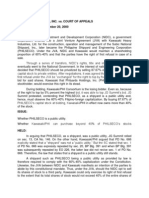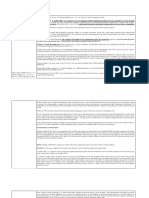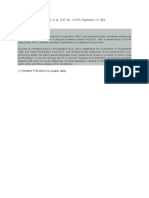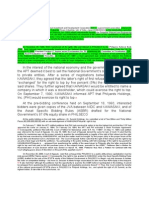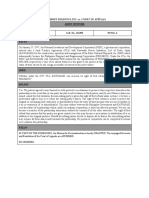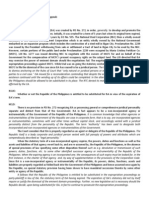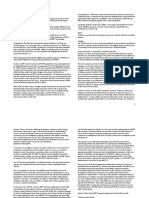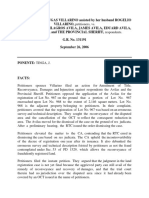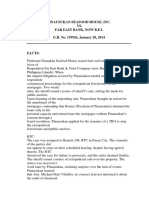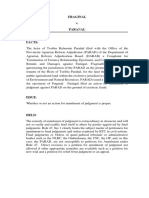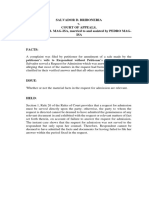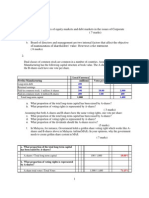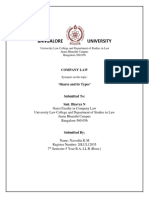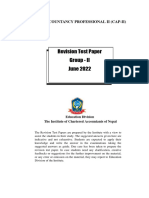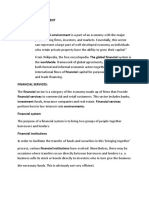0 ratings0% found this document useful (0 votes)
20 viewsRepublic v. Asset Privatization Trust: For Brevity) in A Shipyard Business Named PHILSECO, With A Shareholding
Republic v. Asset Privatization Trust: For Brevity) in A Shipyard Business Named PHILSECO, With A Shareholding
Uploaded by
Benedick LedesmaThe Republic brought a case against the Asset Privatization Trust challenging its decision to allow Kawasaki Heavy Industries, as part of a joint venture with the National Investment and Development Corporation, to choose the winning bidder for a shipyard company. The shipyard constituted a public utility under the Constitution, which limits foreign ownership. The Supreme Court held that the Asset Privatization Trust's actions violated the joint venture agreement and the Constitution by effectively allowing Kawasaki to increase its ownership stake beyond the agreed-upon 40% limit.
Copyright:
© All Rights Reserved
Available Formats
Download as DOCX, PDF, TXT or read online from Scribd
Republic v. Asset Privatization Trust: For Brevity) in A Shipyard Business Named PHILSECO, With A Shareholding
Republic v. Asset Privatization Trust: For Brevity) in A Shipyard Business Named PHILSECO, With A Shareholding
Uploaded by
Benedick Ledesma0 ratings0% found this document useful (0 votes)
20 views1 pageThe Republic brought a case against the Asset Privatization Trust challenging its decision to allow Kawasaki Heavy Industries, as part of a joint venture with the National Investment and Development Corporation, to choose the winning bidder for a shipyard company. The shipyard constituted a public utility under the Constitution, which limits foreign ownership. The Supreme Court held that the Asset Privatization Trust's actions violated the joint venture agreement and the Constitution by effectively allowing Kawasaki to increase its ownership stake beyond the agreed-upon 40% limit.
Original Description:
Original Title
case 3.docx
Copyright
© © All Rights Reserved
Available Formats
DOCX, PDF, TXT or read online from Scribd
Share this document
Did you find this document useful?
Is this content inappropriate?
The Republic brought a case against the Asset Privatization Trust challenging its decision to allow Kawasaki Heavy Industries, as part of a joint venture with the National Investment and Development Corporation, to choose the winning bidder for a shipyard company. The shipyard constituted a public utility under the Constitution, which limits foreign ownership. The Supreme Court held that the Asset Privatization Trust's actions violated the joint venture agreement and the Constitution by effectively allowing Kawasaki to increase its ownership stake beyond the agreed-upon 40% limit.
Copyright:
© All Rights Reserved
Available Formats
Download as DOCX, PDF, TXT or read online from Scribd
Download as docx, pdf, or txt
0 ratings0% found this document useful (0 votes)
20 views1 pageRepublic v. Asset Privatization Trust: For Brevity) in A Shipyard Business Named PHILSECO, With A Shareholding
Republic v. Asset Privatization Trust: For Brevity) in A Shipyard Business Named PHILSECO, With A Shareholding
Uploaded by
Benedick LedesmaThe Republic brought a case against the Asset Privatization Trust challenging its decision to allow Kawasaki Heavy Industries, as part of a joint venture with the National Investment and Development Corporation, to choose the winning bidder for a shipyard company. The shipyard constituted a public utility under the Constitution, which limits foreign ownership. The Supreme Court held that the Asset Privatization Trust's actions violated the joint venture agreement and the Constitution by effectively allowing Kawasaki to increase its ownership stake beyond the agreed-upon 40% limit.
Copyright:
© All Rights Reserved
Available Formats
Download as DOCX, PDF, TXT or read online from Scribd
Download as docx, pdf, or txt
You are on page 1of 1
REPUBLIC
v.
ASSET PRIVATIZATION TRUST
FACTS:
National Investment and Development Corporation (NIDC for brevity) and
Kawasaki Heavy Industries entered into a Joint Venture Agreement (JVA
for brevity) in a shipyard business named PHILSECO, with a shareholding
of 60-40 respectively. NIDC’s interest was later transferred to the National
Government. Pursuant to President Aquino’s Proclamation No.5, which
established the Committee on Privatization and Asset Privatization Trust
(Respondent for brevity) which allowed for the disposition of the
government’s non-performing assets, Respondent allowed Kawasaki
Heavy Industries to choose a company to which it has stockholdings in
order to top the winning bid of JG Summit Holdings over PHILSECO. JG
Summit protested alleging that such act would effectively increase
Kawasaki’s interest in PHILSECO—a shipyard is a public utility--and thus,
violation of the Constitution.
ISSUE:
Whether or not Respondents’ act is valid.
HELD:
A shipyard such as PHILSECO being a public utility as provided by law,
Section 11 Article XII of the Constitution applies. Notably, JVA accorded
the parties the right of first refusal “under the same terms.” This phrase
implies that when either party exercises the right of first refusal, they can
only do so to the extent allowed them by the JVA or under the proportion
of 60%-40% of the shares of stock. Thus, should the NIDC opt to sell its
shares of stock to a third party, Kawasaki could only exercise its right of
first refusal to the extent that its total shares of stock would not exceed 40%
of the entire shares of stock of SNS or PHILSECO. NIDC, on the other
hand, may purchase even beyond 60% of the total shares. As a government
corporation and necessarily a 100% Filipino-owned corporation, there is
nothing to prevent its purchase of stocks even beyond 60% of the
capitalization as the Constitution clearly limits only foreign capitalization.
You might also like
- Konso Property Consultants Limited, Memorandum & Articles of AssociationDocument30 pagesKonso Property Consultants Limited, Memorandum & Articles of AssociationMukibi Pauli69% (16)
- Worldcom Case AnalysisDocument6 pagesWorldcom Case AnalysisNithya NairNoch keine Bewertungen
- JG Summit Holdings vs. CADocument3 pagesJG Summit Holdings vs. CAFrancis Kyle Cagalingan SubidoNoch keine Bewertungen
- 78 JG Summit Holdings Vs CADocument1 page78 JG Summit Holdings Vs CArddelarosaNoch keine Bewertungen
- JG Summit Holdings, Inc. vs. Court of Appeals, 345 SCRA 143, November 20, 2000Document2 pagesJG Summit Holdings, Inc. vs. Court of Appeals, 345 SCRA 143, November 20, 2000idolbondocNoch keine Bewertungen
- JG Summit Holdings IncDocument1 pageJG Summit Holdings IncAnonymous 7BpT9OWPNoch keine Bewertungen
- G.R. No. 124293 January 31, 2005: JG Summit Holdings INC. vs. Court of AppealsDocument2 pagesG.R. No. 124293 January 31, 2005: JG Summit Holdings INC. vs. Court of AppealsDayday AbleNoch keine Bewertungen
- JG Summit Holdings vs. CADocument3 pagesJG Summit Holdings vs. CAjqdomingo100% (3)
- JG Summit Holdings Vs CADocument2 pagesJG Summit Holdings Vs CAKathleen May Domalleg WagawagNoch keine Bewertungen
- Cases To Remember in Corporation LawDocument45 pagesCases To Remember in Corporation LawRessie June Pedrano100% (1)
- JG Summit Holdings V CaDocument1 pageJG Summit Holdings V CaKaren YuNoch keine Bewertungen
- JG Summit Holdings Vs CA GR 124293 2Document1 pageJG Summit Holdings Vs CA GR 124293 2Nurz A TantongNoch keine Bewertungen
- JG Summit Holdings CaseDocument1 pageJG Summit Holdings CasePatricia David-MolinaNoch keine Bewertungen
- JG Summit Holdings Vs CADocument3 pagesJG Summit Holdings Vs CAErnsCNoch keine Bewertungen
- Personae Characteristic Within The JV Arrangement, Allowing Stockholders The Ability ToDocument2 pagesPersonae Characteristic Within The JV Arrangement, Allowing Stockholders The Ability ToCo Tam BehNoch keine Bewertungen
- J.G. Summit Holdings, Inc. vs. CADocument2 pagesJ.G. Summit Holdings, Inc. vs. CADana Jeuzel Marcos100% (1)
- JG Summit Holdings Vs CA DigestDocument2 pagesJG Summit Holdings Vs CA Digestdem100% (2)
- National Economy Cases (15, 16)Document3 pagesNational Economy Cases (15, 16)Mitchie GumeraNoch keine Bewertungen
- JG Summit vs. CaDocument3 pagesJG Summit vs. CaJerraemie Nikka Cipres PatulotNoch keine Bewertungen
- 5.1 JG Summit v. CA, GR No. 124293, January 31, 2005Document1 page5.1 JG Summit v. CA, GR No. 124293, January 31, 2005TricksterNoch keine Bewertungen
- JG SUMMIT V CADocument2 pagesJG SUMMIT V CAMea GuroNoch keine Bewertungen
- Module 7 Case DigestsDocument27 pagesModule 7 Case DigestsMaegan Labor INoch keine Bewertungen
- JG Summit Holdings Vs CA September 24, 2003 PDFDocument2 pagesJG Summit Holdings Vs CA September 24, 2003 PDFErvin Franz Mayor CuevillasNoch keine Bewertungen
- JG Summit Holdings, Inc. v. CADocument2 pagesJG Summit Holdings, Inc. v. CAsophia100% (1)
- JG Summit Holdings VsDocument2 pagesJG Summit Holdings VsVanessa Yvonne GurtizaNoch keine Bewertungen
- Princess - Digest-Corpo-1Document34 pagesPrincess - Digest-Corpo-1Reysel MonteroNoch keine Bewertungen
- JG Summit Holdings v. CA Case DigestDocument3 pagesJG Summit Holdings v. CA Case DigestJustice PrevailsNoch keine Bewertungen
- JG SummitDocument4 pagesJG SummitDorothy PuguonNoch keine Bewertungen
- Case 4 FRANCHISE JG Summit Holding vs. CA GR No 124293Document19 pagesCase 4 FRANCHISE JG Summit Holding vs. CA GR No 124293Rowell SerranoNoch keine Bewertungen
- Pat Last LastDocument10 pagesPat Last LastLeyy De GuzmanNoch keine Bewertungen
- Business Organization - Partnership, Agency, Trust - Dissolution of The PartnershipDocument4 pagesBusiness Organization - Partnership, Agency, Trust - Dissolution of The PartnershipnikkimaxinevaldezNoch keine Bewertungen
- Datu Tagoranao Benito vs. SEC (1983)Document3 pagesDatu Tagoranao Benito vs. SEC (1983)Jeffy EmanoNoch keine Bewertungen
- JG Summit Holdings Inc Vs CADocument3 pagesJG Summit Holdings Inc Vs CAMarie Mariñas-delos ReyesNoch keine Bewertungen
- JG SUMMIT HOLDINGS, INC. vs. CA G.R. 124293 Sept. 24, 2003 - DigestDocument1 pageJG SUMMIT HOLDINGS, INC. vs. CA G.R. 124293 Sept. 24, 2003 - DigestMichelle LimNoch keine Bewertungen
- Case Digest: J.G. Summit v. CADocument5 pagesCase Digest: J.G. Summit v. CADianne Cadorna100% (1)
- Case 33Document5 pagesCase 33montenegroloveNoch keine Bewertungen
- 10 JG Summit Holdings Inc. v. CADocument4 pages10 JG Summit Holdings Inc. v. CAJul A.Noch keine Bewertungen
- Admin Law Case DigestDocument19 pagesAdmin Law Case Digestellemig123Noch keine Bewertungen
- Iron and Steel Authority vs. CA (Case Digest)Document1 pageIron and Steel Authority vs. CA (Case Digest)Trebor CuennoNoch keine Bewertungen
- LandTi - Lee v. Director of Lands - Roman Catholic v. LRCDocument5 pagesLandTi - Lee v. Director of Lands - Roman Catholic v. LRCMariaAyraCelinaBatacan100% (1)
- Iron and Steel Authority Case DigestDocument1 pageIron and Steel Authority Case DigestCheryl ChurlNoch keine Bewertungen
- JG Summit Holdings Vs CADocument18 pagesJG Summit Holdings Vs CACharmaine GraceNoch keine Bewertungen
- Admin - I - 20. Isa Vs CA 249 Scra 538Document2 pagesAdmin - I - 20. Isa Vs CA 249 Scra 538Christine Joy Estropia100% (1)
- Case 46 JG Summit Holdings Inc v. CADocument18 pagesCase 46 JG Summit Holdings Inc v. CAArgie Olano BayonaNoch keine Bewertungen
- JG SUMMIT HOLDINGS v. COURT OF APPEALS, ET AL.Document2 pagesJG SUMMIT HOLDINGS v. COURT OF APPEALS, ET AL.Groggy MorganfreeNoch keine Bewertungen
- Facts: Facts:: Phil Fisheries vs. Central Board of Assessment Appeals Iron and Steel Authority Vs Court of AppealsDocument6 pagesFacts: Facts:: Phil Fisheries vs. Central Board of Assessment Appeals Iron and Steel Authority Vs Court of AppealsGavin Reyes CustodioNoch keine Bewertungen
- Corpo Finals DigestDocument40 pagesCorpo Finals DigestCazzandhra BullecerNoch keine Bewertungen
- Case Digest in CorporationDocument13 pagesCase Digest in Corporationianmaranon2Noch keine Bewertungen
- JG Summit v. CA, GR 124293Document10 pagesJG Summit v. CA, GR 124293Austin Viel Lagman MedinaNoch keine Bewertungen
- Iron and Steel Authority v. CADocument4 pagesIron and Steel Authority v. CAKobe Lawrence Veneracion100% (1)
- JG Summit Holdings Inc Vs CADocument14 pagesJG Summit Holdings Inc Vs CAAJ PaladNoch keine Bewertungen
- Corpo People Vs QuashsDocument2 pagesCorpo People Vs QuashsairoidNoch keine Bewertungen
- Kuwait Airways V. Pal G.R. NO. 156087, May 8, 2009Document91 pagesKuwait Airways V. Pal G.R. NO. 156087, May 8, 2009Jovanni BajanNoch keine Bewertungen
- J.G. Summit Holdings, Inc. vs. Court of Appeals DigestDocument27 pagesJ.G. Summit Holdings, Inc. vs. Court of Appeals DigestRMC PropertyLawNoch keine Bewertungen
- JG Summit HoldingsDocument6 pagesJG Summit HoldingsmerleNoch keine Bewertungen
- Iron Steel AuthorityDocument5 pagesIron Steel AuthorityNathalie Jean YapNoch keine Bewertungen
- Corp Prac Week 6 DigestDocument7 pagesCorp Prac Week 6 DigestCrestu JinNoch keine Bewertungen
- JG Summit Holdings v. CA PDFDocument28 pagesJG Summit Holdings v. CA PDFMarton Emile DesalesNoch keine Bewertungen
- 1 JG Summit Holdings Inc Vs CA Et AlDocument17 pages1 JG Summit Holdings Inc Vs CA Et AljunaNoch keine Bewertungen
- The Letters of Gracchus on the East India QuestionFrom EverandThe Letters of Gracchus on the East India QuestionNoch keine Bewertungen
- A Short View of the Laws Now Subsisting with Respect to the Powers of the East India Company To Borrow Money under their Seal, and to Incur Debts in the Course of their Trade, by the Purchase of Goods on Credit, and by Freighting Ships or other Mercantile TransactionsFrom EverandA Short View of the Laws Now Subsisting with Respect to the Powers of the East India Company To Borrow Money under their Seal, and to Incur Debts in the Course of their Trade, by the Purchase of Goods on Credit, and by Freighting Ships or other Mercantile TransactionsRating: 3 out of 5 stars3/5 (1)
- CIVPRO Case DigestDocument1 pageCIVPRO Case DigestBenedick LedesmaNoch keine Bewertungen
- CIVPRO Case DigestDocument3 pagesCIVPRO Case DigestBenedick LedesmaNoch keine Bewertungen
- CIVPRO Case DigestDocument3 pagesCIVPRO Case DigestBenedick LedesmaNoch keine Bewertungen
- CIVPRO Case DigestDocument3 pagesCIVPRO Case DigestBenedick LedesmaNoch keine Bewertungen
- CIVPRO Case DigestDocument2 pagesCIVPRO Case DigestBenedick LedesmaNoch keine Bewertungen
- CIVPRO Case DigestDocument4 pagesCIVPRO Case DigestBenedick LedesmaNoch keine Bewertungen
- CIVPRO Case DigestDocument3 pagesCIVPRO Case DigestBenedick LedesmaNoch keine Bewertungen
- CIVPRO Case DigestDocument3 pagesCIVPRO Case DigestBenedick LedesmaNoch keine Bewertungen
- CIVPRO Case DigestDocument1 pageCIVPRO Case DigestBenedick LedesmaNoch keine Bewertungen
- CIVPRO Case DigestDocument2 pagesCIVPRO Case DigestBenedick LedesmaNoch keine Bewertungen
- CIVPRO I ActionsDocument2 pagesCIVPRO I ActionsBenedick LedesmaNoch keine Bewertungen
- CIVPRO CAse DigestDocument2 pagesCIVPRO CAse DigestBenedick LedesmaNoch keine Bewertungen
- Cir V. Boac (Tax) : Issue: Whether The Revenue Derived by BOAC From Ticket Sales in The Philippines, Constitute Income ofDocument7 pagesCir V. Boac (Tax) : Issue: Whether The Revenue Derived by BOAC From Ticket Sales in The Philippines, Constitute Income ofBenedick LedesmaNoch keine Bewertungen
- Provos Vs Court of AppealsDocument1 pageProvos Vs Court of AppealsBenedick LedesmaNoch keine Bewertungen
- Encarnacion Vs Amigo FactsDocument2 pagesEncarnacion Vs Amigo FactsBenedick LedesmaNoch keine Bewertungen
- Case 5Document5 pagesCase 5Benedick LedesmaNoch keine Bewertungen
- Case 2Document1 pageCase 2Benedick LedesmaNoch keine Bewertungen
- Case 5Document1 pageCase 5Benedick LedesmaNoch keine Bewertungen
- Anacleto R. Meneses Secretary of Agrarian ReformsDocument2 pagesAnacleto R. Meneses Secretary of Agrarian ReformsBenedick LedesmaNoch keine Bewertungen
- Sample QuestionDocument9 pagesSample QuestionYussone Sir'YussNoch keine Bewertungen
- Financial Management Process of Leading UniversityDocument52 pagesFinancial Management Process of Leading UniversityHumayun KabirNoch keine Bewertungen
- Kuliah 12 Analisis Ekuitas Dan PenilaianDocument38 pagesKuliah 12 Analisis Ekuitas Dan PenilaianElsha FitriNoch keine Bewertungen
- Flipacar Work Deck Wholesaler Version 7 Nov 17Document6 pagesFlipacar Work Deck Wholesaler Version 7 Nov 17tbNoch keine Bewertungen
- Capital Gains Tax-Chap6Document5 pagesCapital Gains Tax-Chap6Garcia Alizsandra L.Noch keine Bewertungen
- Questions 1, 2 and 3Document4 pagesQuestions 1, 2 and 3eeyang2Noch keine Bewertungen
- OPC AOI For Natural Person (Template)Document4 pagesOPC AOI For Natural Person (Template)Kvyn Honoridez100% (1)
- Dhvani Chauhan Task 1Document7 pagesDhvani Chauhan Task 1dhvanichauhan476Noch keine Bewertungen
- VAT Overview - RevDocument62 pagesVAT Overview - RevZachary BañezNoch keine Bewertungen
- Mmi 07 Bma 14 Corporate FinancingDocument20 pagesMmi 07 Bma 14 Corporate FinancingchooisinNoch keine Bewertungen
- Shares and TypesDocument5 pagesShares and Typesnavoditakm04Noch keine Bewertungen
- 028 CRUZ C Fil-Estate Golf and Development Inc. and Fil-Estate Land Inc. v. Vertex Sales and Trading IncDocument2 pages028 CRUZ C Fil-Estate Golf and Development Inc. and Fil-Estate Land Inc. v. Vertex Sales and Trading IncCarissa CruzNoch keine Bewertungen
- Corporate Reporting and GovernanceDocument210 pagesCorporate Reporting and Governanceisabella ayikuNoch keine Bewertungen
- CAP II Group II June 2022Document97 pagesCAP II Group II June 2022aneupane465Noch keine Bewertungen
- Kuda Questionnaire EdinaDocument3 pagesKuda Questionnaire Edinakays chapandaNoch keine Bewertungen
- SCDL Solved Papers & Assignments - Security Analysis and Portfolio Management - Set 3Document13 pagesSCDL Solved Papers & Assignments - Security Analysis and Portfolio Management - Set 3Om PrakashNoch keine Bewertungen
- Treasury SharesDocument9 pagesTreasury SharesKathleenNoch keine Bewertungen
- Open Market Operation-2Document10 pagesOpen Market Operation-2Arslan AshrafNoch keine Bewertungen
- Buyback of SharesDocument70 pagesBuyback of SharesIshu TiwariNoch keine Bewertungen
- The Little Book That Beats The Market Greenblatt en 6222Document5 pagesThe Little Book That Beats The Market Greenblatt en 6222Rahul MuralidharanNoch keine Bewertungen
- Philippine Financial System PDFDocument54 pagesPhilippine Financial System PDFArnel Olsim100% (2)
- Financial Environment DefinitionDocument3 pagesFinancial Environment DefinitionHira Kanwal MirzaNoch keine Bewertungen
- Chapter 4 Balance Sheet CompleteDocument27 pagesChapter 4 Balance Sheet CompleteNael Nasir ChiraghNoch keine Bewertungen
- Project On Reliance De-Mat AccountDocument90 pagesProject On Reliance De-Mat AccountdadhwalsushilNoch keine Bewertungen
- Course Plan: Principle of Accounting IIDocument5 pagesCourse Plan: Principle of Accounting IIYusuf HusseinNoch keine Bewertungen
- Module I. Business Combination - Date of Acquisition (NA)Document13 pagesModule I. Business Combination - Date of Acquisition (NA)Melanie SamsonaNoch keine Bewertungen
- What Is Equity AnalysisDocument4 pagesWhat Is Equity AnalysisShiva Kumar MahadevappaNoch keine Bewertungen
- Stakeholder CapitalismDocument33 pagesStakeholder Capitalismmatimunoz123100% (1)




